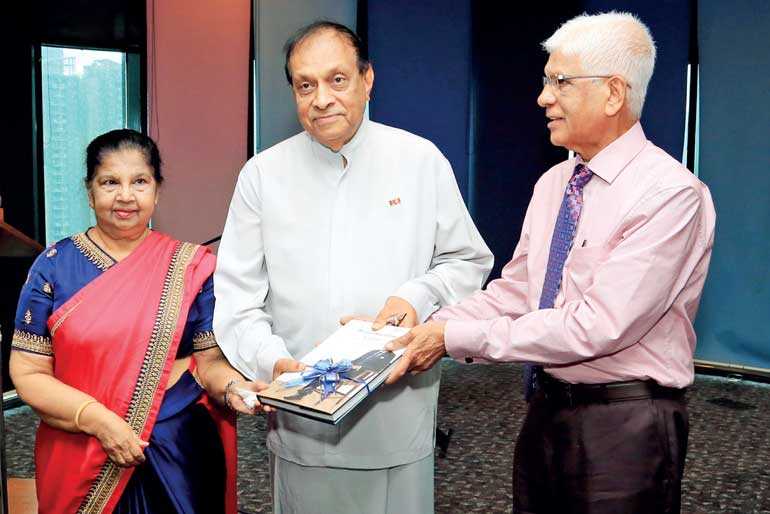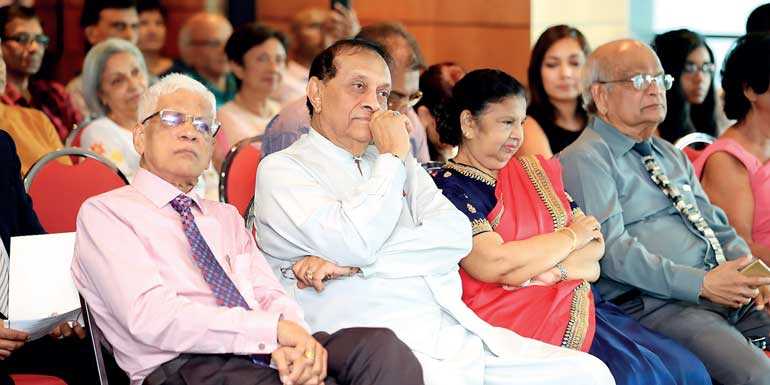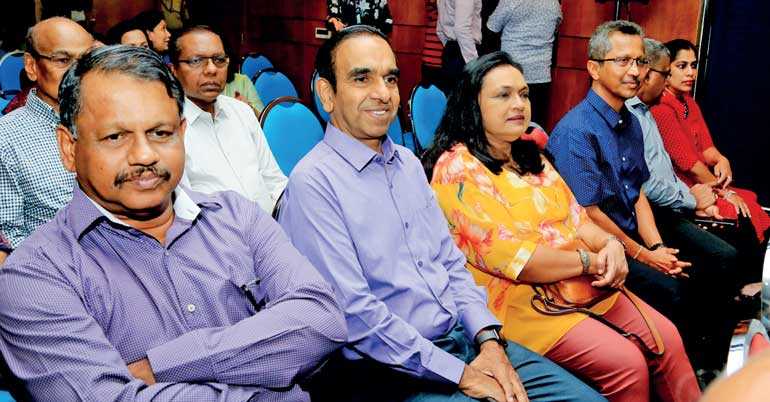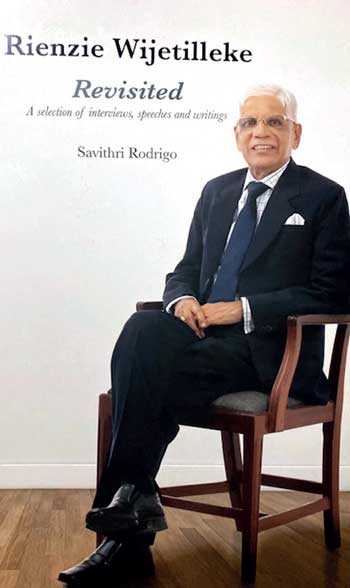Sunday Feb 22, 2026
Sunday Feb 22, 2026
Monday, 11 November 2019 00:02 - - {{hitsCtrl.values.hits}}

Rienzie T. Wijetilleke presenting the book to Speaker Karu Jayasuriya

A section of the gathering at the launch

Rienzie: the man of the hour
During my long attachment to the Central Bank, there was one banker with whom I had a close association. That was Rienzie T. Wijetilleke, known only as Rienzie in the banking circles, who rose to the pinnacle of the Hatton National Bank or HNB to take over its chairmanship but not before holding many other positions including the post of Managing Director.
When he started a novel banking arm for the rural sector of the country, Gemi Pubuduwa or Rural Awakening, I was the Director of Rural Credit of the Central Bank and we had to refinance his agricultural loans under the scheme. Then, in late 1990s, when the Central Bank introduced the forward purchase scheme for farm products to ensure an assured market and a guaranteed price for farmers, HNB under Rienzie’s leadership was a leading partner of the scheme. 
When I was the Chairman of the Institute of Bankers of Sri Lanka and when we sought to get its qualifications accredited by the reputed Chartered Institute of Bankers or CIB, London, Rienzie extended his full support to the initiative as the Chairman of the Sri Lanka Banks Association. This was not because he himself was a lifetime achievement awardee of that prestigious professional body but because his firm belief that Sri Lankan bankers deserved opportunities for quality banking education.
Rienzie’s support to the modernisation of the country’s banking became more prominent when the Central Bank was planning to create what is now known as LankaClear, the Bank’s automated Cheque Clearing House, by getting banking sector participation in it. Some of the commercial banks had reservations about it and the whole enterprise looked getting stalled. Our team was able to convince the senior banker, Rienzie, of the need for it and its long-term viability and it did the trick. When he relayed his conviction to other bankers, all of them decided to come on board as a single body. LankaClear’s past track record has proved that Rienzie was correct.
Savithri’s revisit of Rienzie
Previously in 2007, Rienzie’s biography was penned by Gaston de Rosayro under the title ‘The Banker, The Man, The Legend’. The three words in the title have aptly described him. He was a human being, or more appropriately a Homo sapiens, whose profession was banking but he set a legend in his profession.
Twelve years after this, Savithri Rodrigo has revisited Rienzie in another publication titled ‘Rienzie Wijetilleke Revisited’. It is a journalistic journey through the interviews given by him, speeches delivered by him and writings done by him for over six decades. It is a more of a penetration into his intellectual and professional wisdom rather than a run-through of his personal life.
A life philosophy emanating from self-development
In the Preface to ‘Revisited,’ Rienzie has pronounced his life philosophy. He has said: “I do believe that every person is placed on this earth for a purpose. The path is not always easy, but the purpose is always clear. To me, it was simply to do my best for myself, my family, my workplace, my industry and my country.” His priorities have been in that order, as he has admitted. That is because, though each one is interlinked, “the nucleus to it all is oneself”. In other words, if one does not develop oneself, one cannot help all others in the chain.
It is in accord with the Buddha’s teaching too
A critic might question the order of Rienzie’s life philosophy. It is the usual social ethos that one should do one’s duty to one’s country first ignoring the self. If self is placed before the country or all others, it is normally condemned as an act of selfishness. What is being promoted in society is altruism, a social behaviour requiring one to make the utmost sacrifice for the rest. But, as Rienzie has correctly reasoned, self is the nucleus that connect all others in the social chain of relationships. This is in accord with what the Buddha preached in the meditational procedure involving compassion or Maithree Bhavana. In this practice, one should first wish that he should be free from sorrow and ailment and be vested with a state of happiness. Then, it is extended to close members of family, other relatives, those in the village, country and finally all species. 
The logic is that one can give others only what one has and not ‘one does not have’. It is not unusual for Rienzie to have this life philosophy since the Buddha, as he has confessed in the Epilogue to the book, has been one of the four great personalities who had been responsible for shaping his life. The other three had been Mahatma Gandhi, Winston Churchill and Nelson Mandela. Learning from these great people, Rienzie first developed himself, then his family members, his business and finally thousands of fellow citizens.
Revisiting the philosophical inner core
In ‘Revisited,’ after presenting a brief overview of the main milestones in Rienzie’s life, his philosophy on life, career, country and fellow citizens has been put forward under four main categories. The first category has been on his national mindedness. Then, it is followed by the bigger view he holds on banking. The third category has portrayed how a leader should be made, while the fourth one has dealt with the art and science of inculcating social consciousness.
Professional milestones
After completing his school career at CMS Ladies College and Wesley College, the young Rienzie had had a brief stint as a teacher at the Pembroke Academy and the Central College, Polgahawela. He had taught at Pembroke while studying for the Higher School Certificate there. Then, his passion for banking got ignited which was to remain burning throughout his later life.
He joined the Bank of Ceylon as a trainee and was posted to its Kollupitiya branch. His work was so commendable that the Bank’s management chose to post him to its London branch. Rienzie had then joined HNB as an executive and served in many branches of the bank. Whilst at HNB, he had got a place in the British Bank of the Middle East located in Dubai.
But his fate had closely been linked to HNB and from Dubai he joined once again HNB but this time as one of its Deputy General Managers. This happened in 1987 but within one year, he was elevated to the post of the Managing Director of HNB. He had continued in this position till 2004 when he was suddenly offered the position of Chairman of the Bank. He could not refuse it and had remained as its Chairman till he stepped down in 2011.
Serving society after self-development
Rienzie’s banking career spanning over five decades had been strictly in accord with his life philosophy. He had gained in wisdom and experience but did not want to keep it only for himself. He gave back what he had earned to his family, bank, country and society. He introduced the novel scheme of Gemi Pubuduwa to help the downtrodden villagers, especially their women-folk, to stand on their own feet without depending on handouts to be given by government or society.
He had used his personal money to develop many temples which had been in a state of dilapidation. He contributed to uplift the country’s cricket as interim Chairman of the Sri Lanka Cricket. He had served on many company boards. His service has been not only to business but also to the community and society. Having joined the Rainbow Foundation, he had worked tirelessly to eradicate the menace of addition to narcotics which had not only degraded human beings but also destroyed their productive capacity. He also worked toward the formation of Sri Lanka Stroke Association and held its chairmanship for two years. This he had done without expecting a reward in return. Thus, Rienzie gained, gave and shared.
Giving a fishing rod to the poor
But, Rienzie’s philanthropy was different from what many believe as just showering people with money. It is more of similar to what the 6th century Chinese philosopher Confucius is said to have told a beggar who had asked for a fish when the former was returning from a fishing expedition. Confucius had told the beggar: “I won’t give you a fish, but give you a fishing rod and teach you how to catch a fish.”
Accordingly, Savithri makes the following observation about Rienzie: “He brought with him a self-awareness and experience that he translated into a shared social identity with his team at HNB, urging them to think responsibly and act accountably. His idea of philanthropy was not simply to present people with money, but rather to tackle the root cause of the problem and find a long-term solution, as he did in his boardroom.”
What is more important, according to Rienzie, was the feeling of togetherness among the members of a group engaged in official, business or social work as described by ‘Us’ rather than ‘Me’. It would help people, preached Rienzie to his fellow workers, to understand the diversity among them which in turn would help them to build a sense of unity, a must for long-lasting relations among people.
A wider meaning to CSR
Rienzie’s version of the corporate social responsibility or CSR was much wider than what was normally believed by firms in in the capitalist world. For them, CSR was to have some project that would help them to pass out a fraction of money they have made for some social work. In an interview with LMD, Rienzie had pronounced that CSR goes beyond this narrow version. It requires a firm to look after well all its stakeholders that include employees, immediate community and society. If a firm has done what it is supposed to have done for them, then, it has met with its obligations for meeting CSR.
He had further elaborated on this as follows: “CSR now goes much deeper; it can involve wider issues including gender equality, women’s rights and data privacy.” But corporates would do this only if they are confronted by an educated and well-informed group of people. In the absence of such an atmosphere, the corporates would go to sleep and confine themselves to the narrow version of CSR as practised by many business firms today.
Rienzie had pronounced: “In Sri Lanka, the lack of information and education is a challenge, where an informed and educated public will only hold corporate to higher standards. The public is sometimes guilty of only observing their immediate surrounding and not beyond that periphery, which insulated thinking can lead to unchecked corporate greed”.
Sri Lanka should be run by competent people
When translated from corporate world to the nation, Rienzie believed that the national leaders should have a genuine wish to bring prosperity to people. But the problem in Sri Lanka, as well as elsewhere, people do elect those who are incompetent to rule them. Before coming to power, they project themselves as incorruptible saints. But their real nature comes out only after they have started devouring the taste of power.
Sri Lanka has therefore been eternally marred with a sluggish economy with no hope of growth. When her peers have overtaken her in leaps and bounds, she had remained a laggard among them. This is unusual when private companies in Sri Lanka had flourished year after year. The secret lies in the quality of management whether it is a nation or a private business. Hence, Rienzie argued convincingly that Sri Lanka should be managed by a team of competent people. His frustration has been so high that he had even suggested that Sri Lanka should be handed to such proven world leaders like Lee Kuan Yew of Singapore or Nelson Mandela of South Africa.
To build a disciplined nation, Lee applied rule of law to everyone including his close family members or Cabinet colleagues. What is found in the behaviour of Sri Lanka’s leaders is the complete opposite. When a correspondent from Time magazine asked Mandela why he chose to have an early retirement from politics, he quipped: “Leaving at the appropriate time is also leading.” Such a quality is absent among the Sri Lanka’s politicians and even after they are well past the age of 70, they still clamour to hold on to power.
Rienzie believed that in the case of a business, its continued success depends on selecting and grooming a young generation for leadership and handing the baton to them at the appropriate time. He did so at HNB. True to his word, he left the Bank in the hands of a more competent group of people. That is Rienzie, The Banker, The Man and The Legend Revisited.
A man to be awed and admired
Savithri Rodrigo in her flowing journalistic language has presented this man to us carefully selecting his speeches and writings matched by a glossy and well-meaning album of photographs. Once we finish reading ‘Revisited,’ it is natural that all of us have a heightened awe and admiration for this legendary banker.
(The writer, a former Deputy Governor of the Central Bank of Sri Lanka, can be reached at [email protected].)